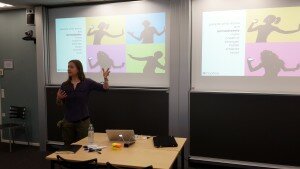On August, 24th, at this year’s MobileHCI conference in Copenhagen, members of the RECALL team organized and hosted the workshop on “Mobile Cognition – Using Mobile Devices to Enhance Human Cognition”. We gathered 11 attendees and 7 accepted position papers involving topics like using lifelogging to foster behavior change in a mobile environment as well as cognitive challenges during navigation tasks, just to name a few.
We were delighted to have managed to win mc schraefel (@mcphoo) as keynote speaker. She’s a Professor of Computer Science and Human Performance at the University of Southampton, UK, where she leads the Wellth Lab. mc delivered a most inspirational keynote on the challenges of a mobile being and the effects of being mobile on the mind-body connection as an interconnected system.
During the paper presentations and vivid discussions it became clear that there was a need for a comprehensive definition of the term and field of ‘Mobile Cognition’. One of the outcomes of this workshop comprised this very definition as well as a research agenda connected to it:
The term mobile cognition describes a coherent and innovative digital framework that addresses the challenges of how information is perceived and cognized differently when on the move, and how digital technology can augment and enhance these processes. Mobile technologies allow people to be moving, location-independent, while having Internet access through ubiquitous connectivity. While physical body movement enhances cognitive processes, people are generally constrained compared to when having more comprehensive information access information infrastructure such as a fully equipped office with higher internet connection speed, more computing power, larger information display etc. Hence, decision-making while on the go is limited due to several constraints that relate not only to people’s spatio-temporal environmental behavior but also to their interaction with mobile devices, and perceptual, cognitive, and social processes when being mobile. Mobile cognition research takes into account the four types of mobility:
-
Physical movement: movement supports general well-being (part of the InBodied5), which in turn supports cognitive processes.
-
Being moved: people on the go use different kinds of transportation modes: while using transportation that does or does not involve the user in navigation tasks, the usage of technology comprises the mode of transport (e.g. a train) as well as the mobile devices the user interacts with while being moved.
-
Moving with technology: while on the go, people interact with a good deal of technologies including wearables (e.g. smartwatch, eye-wear), mobile phones, or tablets.
-
Virtual moving: this category class includes simulated movements through virtual environments, for example, or ex-ante wayfinding tasks.
The workshop’s participants are eager to further develop this framework with the goal of shaping the definition and possibly steer a new research direction towards ‘Mobile Cognition’.
The full workshop program is available under: